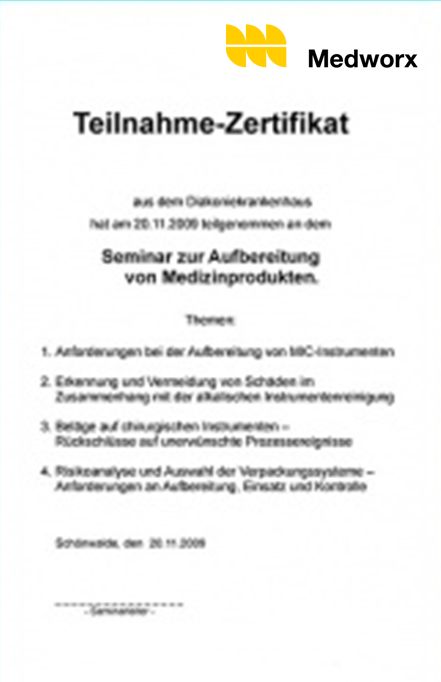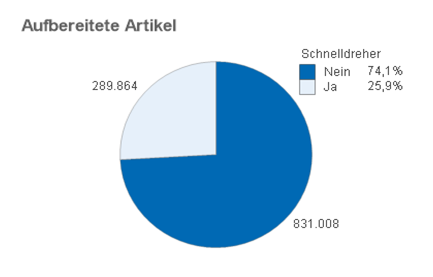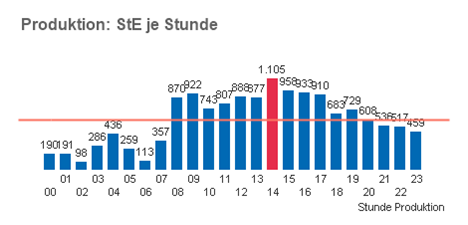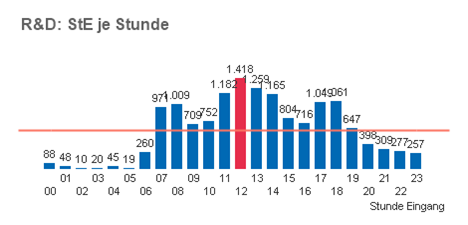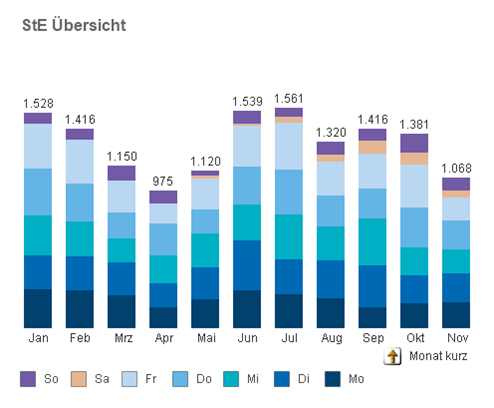Manage sustainably.
Manage efficiently.
Know what is going on: Organize instrument use cycles optimally.
Instrument management for resource, quality, and cost optimisation: Medworx and the affiliated companies of Sana Klinik Service offer you all consulting services having to do with your instruments. In end-to-end solutions, we optimise and standardise your processes, we use your data as a basis for decision-making, and we optimize your resource planning and the quality and costs of your instruments. This is just like with Medworx instrument management services, with which you always know how many instruments are in circulation where, how, and in what quality. In addition, Medworx instrument management services ensure you know how you can equip and free up your surgical instrument sets and trays.
End-to-end instrument management
Instrument management has many facets, which the Sana Klinik Service Group looks at in its entirety: Medworx as a workshop specialising in manufacturer-independent repairs of instruments, Roeser Medical as a trading company specialising in manufacturer services, Sana Sterilgut Service as an experienced CSSD operator, Sana Medizintechnisches Servicezentrum as an experienced operator of medical technology, and Sana Klinik Service as the parent company and independent consulting unit of its affiliated companies.
We are driven by the demand to consider challenges in the interest of our customers from different perspectives so as to find alternative solutions that optimally meet the goals of our customers. Our instrument management services support data-driven decisions on an objective basis. This provides safety and functionality in the OR or OT, sustainability and cost optimisation in purchasing, and clarity and control in management. In the network of the Sana Klinik Service. With process modules from the instrument management cycle and with comprehensive service and consulting services, we help specialist managers from OR and SSD/SPD to optimally organise their instrument management cycles.
Protect investments. Preserve autonomy of action.
Do you wish to know how many instruments you currently have in circulation? What condition they are in and if are they are still safe? Do you need certainty about the resources required and the instrument costs for your clinic or hospital? And what about the surgical instrument trays: How many instruments are in them and how up-to-date are the compositions of the surgical instrument trays? The answers to these questions and more can be found with Medworx instrument management services. Medworx instrument management supports handling surgical instruments in a manner which is independent of manufacturers, sustainable, and cost-conscious.
Those who have an overview of their assets also achieve gains from their assets for a longer period of time.
Because the surgical departments and CSSD require many resources of a hospital or clinic, it is important to maintain an overview at all times. It is necessary to know the availability, use, control, procurement, repair, care, and costs of your surgical instruments. Medworx instrument management services give you this overview. For ease of use in processes. For the safety of patients and users. For a hospital that ensures a high standard of quality in the interest of patients. For the best economic efficiency and the optimal use of existing assets.
How Medworx instrument management services optimise your inventory and processes.

The modules of the Medworx instrument management service – in the Sana Klinik Service Group.
The whole is more than the sum of the individual parts: Sana Klinik Service and its affiliated companies.
Medworx is the manufacturer-independent instrument repair expert in the Sana Klinik Service Group. Our affiliated company, the trading company Roeser Medical, is a professional supplier in the segment of manufacturer service when it comes to instruments. The solution models of the manufacturer-neutral instrument repair company and the manufacturer-service-representative trading company compete for the best solutions so as to offer alternative and independent solution models in the interest of our customers in the Sana Klinik Group.
The instrument knowledge and routine in the practical handling of questions on instruments is rounded off in the Sana Klinik Service Group by the expertise of the associated companies Sana Sterilgut Service as a professional operator of sterile processing departments and Sana MTSZ as an experienced and one of the largest service companies for medical technology in Germany.
In the Sana Klinik Service Group with its own experienced and independent consultants for all questions relating to medical technology, CSSD, surgery, instruments, and purchasing, the entire knowledge of our associated companies is available to you – independently, professionally, and oriented towards your goals. There are no questions or opportunities related to surgical instruments that a company in the Sana Klinik Service Group cannot develop in accordance with your objectives.
SIMA: Analysis. Optimisation. Efficiency.
If you wish to optimise processes and utilisation, you have to know your figures. Medworx instrument management services with SIMA help you with this. The Instrument Management Analysis combines key figures from different areas, prepares them, and displays them in a detailed analysis including dynamic diagrams. The goal: to adapt the content and quantity of the inventory of trays and instruments to the needs of your medical facility and to identify potential for improvement in sterile reprocessing; for example, by analysing turnaround times and tray loads. Based on the data obtained, Medworx develops suitable measures for optimisation.
Analytical diversity. Clear findings.
SIMA is a data-based consulting service. The analytical information obtained goes far beyond standard evaluations of existing CSSD software. Statistics on how often instruments are reprocessed are presented graphically over the course of time and are associated with information on tray use frequencies and tray idle times. In addition, data on quantities of reprocessed instruments are presented with reference to specific items and integrated planning for efficient instrument stores. We have benchmarks from more than 100 client hospitals and CSSD that allow us to compare your data and identify potential. SIMA is complemented by the know-how of our IMM specialists, who present, validate, and discuss results and are then available for problem solving.
Detect tray movements. Identify potential.
Instrument trays with a high movement frequency are the trays that are most frequently used for operations. When (starting at how many uses) a tray becomes a high-frequency tray depends on several factors. If, for example, the CSSD is integrated into the clinic, a tray does not yet fall into the category of high frequency even with 100 uses per year. However, if there is an external location with external delivery, it must be assumed that the circulation occurrences are higher. Thus, even an instrument tray with 80 uses per year can already be a high-frequency tray. Low-frequency trays are trays which are used in few operations. This may concern trays which contain too many instruments and are therefore rarely used. It may also concern special trays that are used in emergencies or during rarely performed operations. Or these may be trays which must be provided to comply with laws and regulations.
We discuss these factors in an easy-to-understand way and individually with you based on your situation. Then we show you the potential for optimisation. For example, let us say you have ten laparoscopy trays in stock. The average use per year is 50 times per laparoscopy tray. The laparoscopy trays 1 through 5 are used 80 times, whereas the laparoscopy trays 6 through 10 are used only 20 times. It can therefore be assumed that the stock of laparoscopy trays 6 through 10 could be reduced without there being any supply bottlenecks.
What we save for you
Example: general surgery cost centre
Set of instruments:
Standard and MIS instruments
Reference quantity:
Frequency of instrument reprocessing
Analysis:
50 trays of 48 instruments each = 2,400 instruments
Result of a reduction in instruments:
15% potential for savings = 360 instruments
What we can do for you
- Evaluation of the inventory of instruments according to reprocessing frequencies
- Optimisation of instrument inventories
- Identification of idle and storage times
- Overview of all items including inventory and reprocessing key performance indicators
- Overview of all surgical instrument sets including utilisation rate per type of instrument set
- Instrument set utilisation analysis including reprocessing statistics along with daily and weekday utilisation rates
- Suggestions for a tailor-made reserve instrument stock including defining minimum stocks
- Customer-specific analyses
Example of cost reduction with SIMA
Result of procurement cost reduction
| 360 instruments | Avg. 129 EUR* |
| Total | 46.400 EUR |
*Avg. gross prices for standard and MIS instruments
Result of reprocessing cost reduction
| 360 instruments 110 cases of reprocessing => 39.600 cases of reprocessing |
0.5 minutes => 19.800 minutes |
0,60 EUR* |
| Total | 11.800 EUR |
*Share of labour costs per productive minute
Result of cost reduction in the maintenance process
| 360 instruments | 7% maintenance share | 58 EUR* |
| Total | 1.750 EUR |
*Avg. gross maintenance costs
MIKO: determination of your annual instrument costs
Do you know your annual instrument costs? This is immensely important for the economic management of your surgical instruments. The annual instrument costs of a 600-bed hospital can be between 150,000 EUR and 1,300,000 EUR. Medworx applies our analysis tools to determine your annual instrument costs. We identify the potential for rationalisation and benchmarks with over 200 customer hospitals independently and anonymously.
Those who know their costs can minimise them.
The path to lower costs
- After signing the order and confidentiality agreement, you send us the transaction data from the accounts payable department – on the basis of more than 100 creditors – with the corresponding expense accounts stored.
- We evaluate the data within four days.
- Qualified processors, instrument specialists, and tax consultants check the supporting documents on a random basis within four to six days on the basis of the findings obtained to this extent.
- After that, we check the plausibility of the analysis of the vendor accounts and expense accounts for you.
The result
- The results of the determination of your annual instrument costs are summarised in a multi-page report.
- You can benchmark against more than 200 reference clinics.
- The results show potential savings – at least in the high five-digit range, regularly in the six-digit range , and surprisingly often in the high six-digit range and beyond.
Why most hospitals and clinics know so little about their instrument costs
Instrument costs consist of the costs of instrument repair, the costs of new and refurbished instruments to replace those that cannot be repaired, and the costs of the new purchase of instruments. Few hospitals are aware of these annual instrument costs. Why is this the case?
- Instrument costs form part of the empire of small numbers in the administration of hospitals.
- Their procurement processes are often below the thresholds of practiced four-eye principles.
- In the accounting department, instrument costs are allocated to various accounts of the KHBV (Hospital Accounting Regulation, Krankenhaus-Buchführungsverordnung) of the groups 66, 68, 69, and 72.
- Here, the figures are atomised until they are unrecognisable and without the ability to be aggregated.
Surgical instrument tray audit and determination of instrument quality
Only if you know the quality of your instrument inventory can you make independent, valid decisions about repair or new purchase. We provide you this basis for decision-making with audits of surgical instruments and assessments of instrument quality. It is often not sufficient to consider only individual trays with a very limited sample size in order to then determine a total investment volume by extrapolation on this basis. That is why we focus on your needs and objectives. We offer you surgical instrument audits with the departmental assessment of instrument qualities over random samples of 20, 30, 40, and 50 percent of the respective instrument stock. Durchgeführt von Chirurgiemechaniker-Meistern und mit allen Fachkundequalifikationen ausgestatteten Experten unseres Verbundes, die herstellerunabhängig und ohne jedes Instrumentenverkaufsinteresse fachliche Expertisen erstellen.
- We check the condition and functionality of your instruments. This gives you differentiated statements on individual instruments, individual types of instrument trays, and exact instrument trays.
- We classify the instruments into four categories during quality analysis:
- A: The instrument is fully functional.
- B: The instrument is functional, but has surface problems (e.g. due to discoloration, plaque, or corrosion).
- C: The instrument is functional to a limited extent, a repair is indicated.
- D: The instrument has a far-reaching functional limitation, a repair is uneconomical or qualitatively pointless, and a replacement is necessary.
Instrument tray reorganisation and optimisation with benchmarking
In 90 percent of all German hospitals, there are too many trays in circulation or trays that are insufficiently used. Or the existing trays are equipped with too many instruments, because their inventory has grown instrument by instrument over the years. This results in unnecessary costs in procurement, cleaning, maintenance, and replacement as well as additional costs of capital commitment. In order to avoid this, we create a standard and sample tray catalogue according to your needs by department, unit, or ward.
On the basis of the objectified data from SIMA, we can carry out surgical instrument set reorganisation and optimisation for all units with surgical procedures and their tray and instrument stocks – which are based on the benchmark sets of more than 200 customer hospitals. These benchmark-capable tray inventories allow us to substantiate which standard tray inventories are necessary for you and which you can dispense with. Alternatively, we develop rationalised tray inventories that suitably meet your needs, based on your individual range of services and your specific requirements.
Instrument manager
Parameters for operational decisions on repairs, repair limits, replacement of instruments that cannot be repaired, and new purchases of instruments.
The workload in hospitals continues to increase more and more. Moreover, ongoing business operations in operating theatres and CSSD are leaving less and less time for the processes and decisions that generate costs in the long term and consume economic and ecological resources. The time available to acquire or apply expert knowledge is decreasing. And expert knowledge is needed to make sound decisions about repair or procurement of replacement instruments, or the new purchase of instruments. Comprehensive, specialised, and constantly advanced knowledge is required to know the limits of repair of instruments and to make the decisions that are useful for your organisation when there are the possible conflicts of objectives of quality, economy, and sustainability in instrument management.
Medworx provides experienced and long-standing instrument managers on site or by videoconference. Our employees and other experts from the Sana Klinik Service Group support you with their many years of know-how, according to your goals, independently in the daily decision on repair, replacement, or new procurement. We provide these services by supplying approved, assuming functions with service contracts, with services, or by further training and educating personnel you select.
More knowledge for lower procurement costs: Medworx’s training and development programme.
The surgical instruments of a clinic usually encompass thousands of instruments with procurement values of up to several million Euros. This fact, along with the points of patient safety and user safety, make it necessary to handle the instruments sensitively and in a way that protects their value and sustainability. It also presents the employees involved with the instruments with ever new challenges arising from legal conditions and technical developments.
Continuing education and development, including in the form of training courses, are among the essential measures to convey the basics and necessary know-how, combined with the aim of qualifying and promoting the competence of specialists in charge of the interaction between OP and CSSD against the background of supply requirements and usually budgeted cost structures in connection with repair and instrument management. This is because approximately 25–35% of the instrument stock is used daily in application and reprocessed by the CSSD. This also means the preservation of the asset value of up to one million euros is decided every day by the specialist staff when using and reprocessing the instruments. These tasks require staff qualified in repair and instrument management.
Knowledge and know-how from theory and practice:
Medworx has developed an extensive training programme based on more than 30 years of cooperation with hospitals, clinic groups, and universities and the resulting know-how in the context of empirical data on instruments. We offer you both individual continuing education training concepts that are custom-tailored to the qualifications of your employees and standardised training schemes. Our Medworx training offer ranges from advanced and further training as an instrument manager at our location to short interval training courses at your site.
The response and positive effects on the instrument processes and resulting optimisation of quality and efficiency encourage us to continue on this path over the long term and to actively adapt our training offer to your requirements. Our speakers empower participants to expand and strengthen their knowledge and competence through interactive and practice-oriented lectures. We are also available as a contact partner after completion of the training course.
